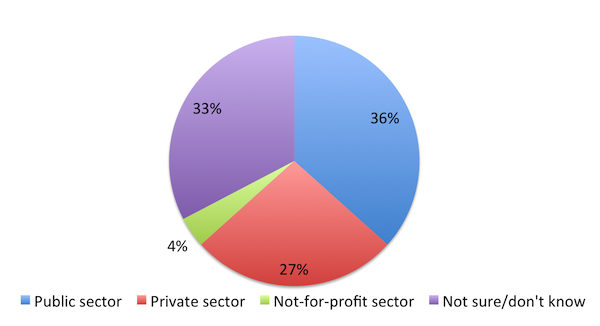…when they grow up, that is. It’s a question we don’t ask that often. Yet since one of higher education’s supposed purposes is to give students a leg up in the search for work, it’s the kind of thing you’d think we’d want to know.
So, anyways, using our CanEd Student Research Panel, we asked 1280 students across the country about their employment futures. For starters, we asked them what sector they saw themselves as destined for.
Expected Employment by Sector

Among those who knew where they were headed, it was about an even split between public and private sector. That’s not quite as unlikely as it seems – all our education students would be public sector, for instance. But it’s still high on the public side. Non-profits seem to hold surprisingly little allure.
We then asked the degree of relationship students thought their field of study would have to their eventual job. The answers were nuanced and on the whole fairly realistic. Only 41% thought they were in a program which would be the best or the only possible one for their eventual job, but 80% thought their field of study would have some kind of relationship to their job.
Relationship between Field of Study and Job

In terms of the actual fields students thought they would be working in, 24% said it would be in some kind of professional scientific and technical services, with health care/social assistance and educational services at 16% each. No other field received mentions by more than 3% of respondents.
One intriguing finding was what skills students thought would be important to demonstrate when looking for a job. By and large, they seem to think that it is what are often termed “soft skills” – the ability to communicate, self-management, time-management, etc. – that tended to come up as being more important. Of the more cognitive attributes, problem-solving, was the only one that ended up near the top; other attributes like creativity and numeracy came much further down the list. Actual intellectual achievements – like having good grades or possessing a second language came almost bottom.
Importance of Possessing Various Skills/Traits When Looking for a Job (4-point scale, 4 is high)

Least important of all, according to students, was having a degree from a prestigious school. In case you’re wondering, that’s not just wishful thinking from students at less-selective institutions – students at medical/doctoral institutions rank this one last, too (although that may just mean that students at these schools don’t think their own institutions are all that prestigious).
So – how honestly can you say that your school’s programs are emphasizing things like communication skills, self-management and team-work? If the answer is “not very,” stop wondering why students might be skeptical about any slogans you may have about your school helping them get jobs. The answer is right above.

 Tweet this post
Tweet this post

So tell me, is developing, documenting or validating communication, self-management and team-work skills the job of Higher Education?
Why wouldn’t it be? In medicine, for example, all those skills are explicitly tested for as part of the CanMEDS curriculum. And virtually all the self-justifying “we’re relevant too” stuff out of the humanities suggests that “communication” is one of the benefits of a degree in those fields.